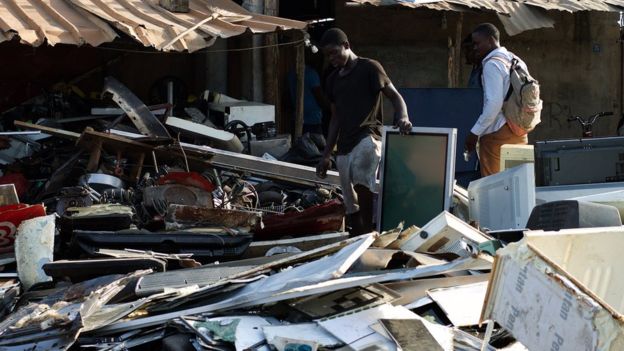In 2017, it is estimated that over 500,000 tons of e-waste were imported into Togo. Some of them are a pure health hazard, while the majority are plain old inefficient as per modern standards. Ideally, they should be recycled, not shipped from the industrialized nations to the developing ones. However, there is one man who has come up with an innovative way to put these junk into positive use.
One Ousia Foli-Bebe rips these e-waste apart in search of parts he could use, or rather innovate on, and makes inspirational robots out of them. He was featured by The BBC for his robotic spider, which he built using parts scavenged off an old printer.
“I made this from a [discarded] 3D printer,” said Foli-Bebe. “The plastic retrieved from the printer became the arms and legs. And I made a 3D printer as well from e-waste. I actually learned how to make the printer from the internet.”
Foli-Bebe uses his innovation as a source of inspiration for kids in school to take up STEM and appreciate the value of recycling.
“My hope is to make a science kit so that they can begin to make their own things and solve the problems of this community.”
He is one of the growing numbers of youths who have taken e-waste as an entrepreneurship opportunity and find innovative ways of creating something useful from them. According to the E-Waste Center, Togo receives about 500,000 tons of e-waste each year.
Foli-Bebe for on has a motley collection of old TV sets among other electronics outside his lab. The e-waste are so many they could cover an entire tennis court. However, he does share the e-waste ‘dump site’ with other recyclers.
Foli-Bebe and other also use the chance they have to recycle e-waste to learn about electronics. Take, for instance, Gnikou Afate who created Togo’s first 3D Printer. All the knowledge he used in creating the device, he learned from the e-waste ‘dump site.’ The printer Afate created was so remarkable that it was displayed at the Barcelona Fabrication Technology conference back in 2015.
Afate, who was previously working with the tech hub Woelab, has since moved on to establish his own lab, which is situated in a small workspace just next to his house.
e-Waste becomes Goldmine
Afate and friends have found e-waste to be a source of revenue if one knows how to use them right.
“At first, electronic waste was a plague – that’s how we used to describe it… Our streets were littered with old computer bodies rotting away. But today that problem has turned into an opportunity. E-Waste could be described as goldmine,” said Afate.
Each year, hundreds of vans and lorries drive out of the Lomé’s port carrying old mobile phones, TVs, laptops, and generators among other e-waste. The vehicles drive into the market and buyers gather around and dig for electronics that are in not so bad conditions.
For more information on this developing e-waste recycling story in Togo, please click here.



